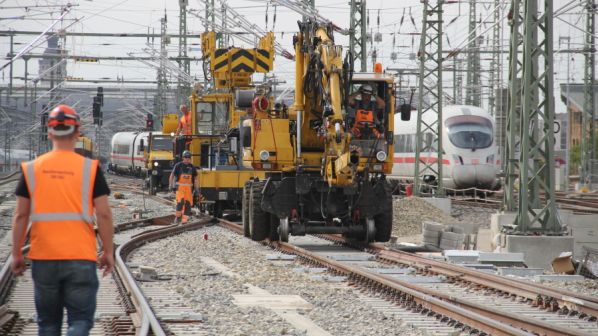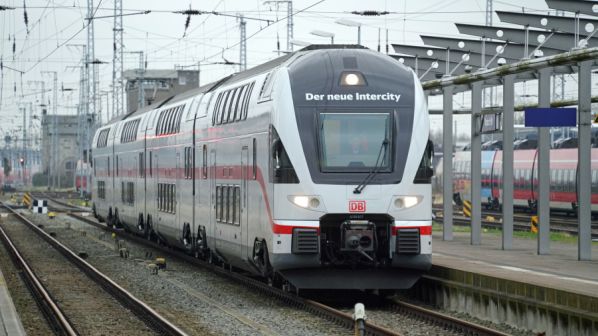GERMAN Rail (DB) has reported an after-tax loss of €5.7bn in the 2020 financial year, reporting revenues of €39.9bn, a 10% drop compared with 2019, which was the result of the Covid-19 pandemic and a write-down on the Arriva subsidiary.
However, the company expects a swift recovery, with an operating profit predicted for 2022.
DB recorded an operating loss of €2.9bn in 2020, compared with a €1.8bn profit in 2019. Long-distance services recorded a €1.7bn loss, while the special effects, including the impairment loss at Arriva, contributed to a €1.8bn loss. Passenger satisfaction reached a record high, while 81.8% of long-distance trains arrived on time, up 6% on 2019.
DB’s international logistics subsidiary, DB Schenker, bucked the trend and performed extremely well, ensuring stable supply chains for essential freight around the globe. DB Schenker generated €711m in adjusted Ebit, a record high.
DB responded to the pandemic with a programme of spending cuts, which resulted in a €1.7bn of savings in 2020.
“We will cut costs and cover half of our Covid-19-related losses in the integrated rail system by 2024 ourselves - with sensible measures to generate some €5bn in savings,” DB CFO, Dr Levin Holle, said while announcing the results. “DB Group aims to be profitable again from 2022. To this end, we need to implement an extensive, systematic programme to respond to the financial effects of the pandemic.”

The German federal government approved measures to strengthen DB’s equity on June 3 2020, with €5bn allocated in the 2020 supplementary budget. The government also approved an additional one-time increase of €2.5bn in the regionalisation funds in 2020, alongside a possible reduction of the Renewable Energy Sources (EEG) levy to 6.5ct/kWh in 2021 and 6ct/kWh in 2022 through compensation payments.
Under the stimulus package, €150m has been made available in 2020 and 2021 to install GSM-R terminals, along with €160m to increase the attractiveness and accessibility of stations. Another €500m has been allocated to digitise infrastructure by the end of 2021.
DB carried 1.5 billion passengers in Europe in 2020, down 42% on 2019. DB Long Distance carried 81 million passengers, down 46%. DB regional saw a 38% drop in passenger numbers, while passenger volume across the group dropped 47% to 52 billion passenger-km in 2020.
“Our trains were much emptier than usual, even during the brief period of recovery we saw in the summer,” says DB chairman, Dr Richard Lutz. “As a company whose business model is mobility, we were hit especially hard when people stopped travelling.”
Total freight carried by DB Cargo fell by 8% year-on-year. The operator carried higher volumes of commodities such as groceries, but saw lower volumes in key industries such as automotive, steel and ore.
A half-hourly Hamburg - Berlin service was launched in 2020, along with a new inter-city service between Rostock and Dresden, which Lutz says has been “a major success.” New international services were also launched between Munich and Zurich, and Berlin and Krakow.
DB hired 26,000 new employees in 2020, in particular train drivers, service crews and maintenance technicians.
Outlook
The railway says it will need some time to counter the impact of the pandemic, which is still ongoing. DB Group currently anticipates a €2bn adjusted loss before interest and taxes in 2021. Revenues are expected to increase to at least €41bn. However, forecasts are still subject to a high level of uncertainty due to the pandemic.
The railway says it plans to recover from the effects of the pandemic by sticking to its long-term expansion programme, with the German government increasing investment in rail. Gross investment increased by 10% to €14.4bn in 2020, a new record, while net investment increased by 4.3% to €5.9bn. This included €12.2bn in rail infrastructure, such as upgrading the Mannheim - Stuttgart high-speed line and the Munich - Zurich line. Another €2.4bn was spent on rolling stock, including the purchase of 24 new ICE 4 trains and 19 new double-deck IC trains. Another 30 ICE 3 neo trains and 100 DB Cargo locomotives were ordered in 2020.

Holle said that this investment was conditional on DB keeping in check its debt, which sits at €29.3bn after the federal government increased its debt ceiling from €25bn to €30bn.
“Based on our budget, we do not expect net financial debt to be at least significantly higher at the end of 2021,” Holle says. “This will of course ultimately depend on whether the federal government can carry out the equity support measures announced for this year. And more than anything, our ability to keep our debt in check will depend on whether the pandemic and its impact do actually become more manageable over the course of 2021.”
Looking forward, Lutz says the trend of more people working from home, which has accelerated during the pandemic, is not expected to result in a reduction in the number of people travelling.
“We’ve seen around the world that digital societies are more mobile societies,” he says. “As life and work become more flexible, we will also have more opportunities to live and work on the go.
“And once Covid-19 becomes less of a concern, people will also start to focus more on climate change again. It may not be the centre of attention at the moment, but it is no less important for that. One response to the climate crisis is to shift more traffic to rail. Rail is the greenest of all modes of motorised transport - it is essentially a vaccine for climate change.”
DB plans to attract more passengers to switch from flying to rail with its XXL ICE, new night train lines and Super Sprinter services.
DB Cargo plans to double rail traffic to and from China, as well as offering improved overnight connections between European ports and German economic centres.
Infrastructure spending is expected to increase to €12.7bn in 2021, an all-time high, which will lay the groundwork for a German-wide integrated regular-interval timetable.
A day before the results were announced, DB’s supervisory board extended the contracts of Lutz, board member for passenger transport, Mr Berthold Huber, and board member for infrastructure, Mr Ronald Pofalla.
Lutz and Huber’s contracts have been extended by five years until March 2027, while Pofalla’s contract has been extended until July 2025 when he is due to retire. Board member for digitisation and technology, Dr Sabina Jeschke, announced in February that she will leave DB in May. Jeschke plans to become involved in supporting start-ups, especially at an international level, and high-tech developments.

